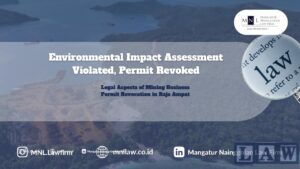
Legal Aspects of Mining Business Permit Revocation in Raja Ampat
The government has officially revoked the Nickel Mining Business Permits (IUP) of four companies operating in the Raja Ampat region, namely PT Kawei Sejahtera Mining, PT Mulia Raymond Perkasa, PT Anugerah Surya Pratama, and PT Nurham. The primary reasons for this revocation are that the permit locations fall within the protected Raja Ampat Geopark area and the failure to meet the requirements of the Environmental Impact Assessment (AMDAL). In contrast, PT Gag Nickel, a subsidiary of PT Antam Tbk, retains its IUP as its operations are outside the Geopark area and it has fully complied with AMDAL regulations.
What is a Mining Business Permit?
According to Article 1, point 7 of Law No. 2 of 2025 concerning Amendments to Law No. 4 of 2009, a Mining Business Permit (IUP) is a legal authorization granted by the government to businesses, cooperatives, or individuals to conduct mining activities for minerals and coal. These activities include exploration and production stages within designated areas.
Mining Business Areas
A Mining Business Area (WUP) is an officially designated zone for mining activities, as outlined in the Mining Business Permit Area (WIUP) map. This area can span across regencies, provinces, or even maritime zones, in accordance with applicable laws. The designation of WUP is crucial to ensure mining activities do not conflict with other spatial planning interests, including protected areas, as stipulated in Ministerial Regulation No. 7 of 2020 concerning Procedures for Granting Areas, Permits, and Reporting.
Mining Business Permit
The authority to issue Mining Business Permits is regulated under Law No. 2 of 2025 concerning the Fourth Amendment to Law No. 4 of 2009 on Mineral and Coal Mining, where the Central Government may delegate the authority to grant Business Permits to Provincial Governments in accordance with prevailing laws and regulations.
Why Can an IUP Be Revoked?
An IUP can be revoked if the permit holder is found to have violated regulations, particularly those related to environmental protection and spatial planning. In the case of Raja Ampat, the revocation resulted from a comprehensive evaluation of the companies’ compliance with environmental regulations and the protected status of the Geopark, which holds national and international significance.
Legally, this revocation is based on the contrarius actus principle, which states that the institution or official authorized to issue an administrative decision also has the authority to revoke or annul it if violations or non-compliance with permit conditions are discovered.
This is further supported by Article 152 of Law No. 4 of 2009 on Mineral and Coal Mining, which states: “If the regional government fails to implement the provisions as referred to in Article 151 and based on the evaluation results conducted by the Minister as referred to in Article 6 paragraph (1) letter j, the Minister may temporarily suspend and/or revoke the IUP or IPR in accordance with applicable laws and regulations.”
However, Article 153 of Law No. 4 of 2009 on Mineral and Coal Mining stipulates: “If the regional government objects to the temporary suspension and/or revocation of the IUP and IPR by the Minister as referred to in Article 152, the regional government may submit an objection in accordance with applicable laws and regulations.”
In mining permits, revocation can occur after an evaluation. The authority to conduct evaluations for mineral and coal mining activities lies with the Director General of Energy and Mineral Resources (ESDM) on behalf of the Minister, as regulated in Article 14 point (6) of Ministerial Regulation No. 7 of 2020 concerning Procedures for Granting Areas, Permits, and Reporting.
Writter : Nicko Surya Airlangga, S.H. & Masta Pasaribu
Editor : Muhammad Arief Ramadhan, S.H.
